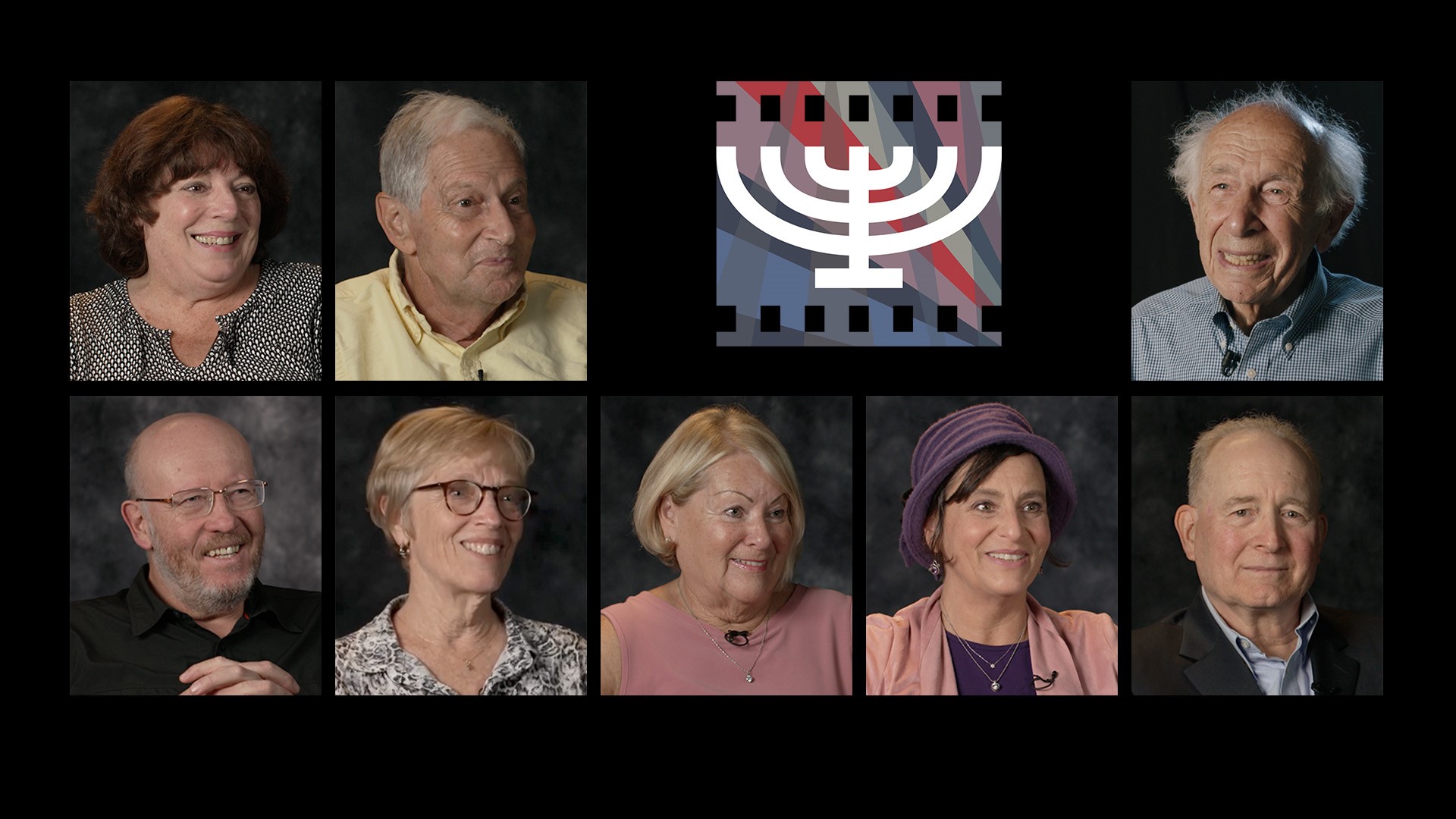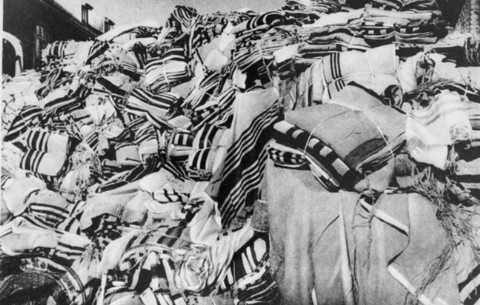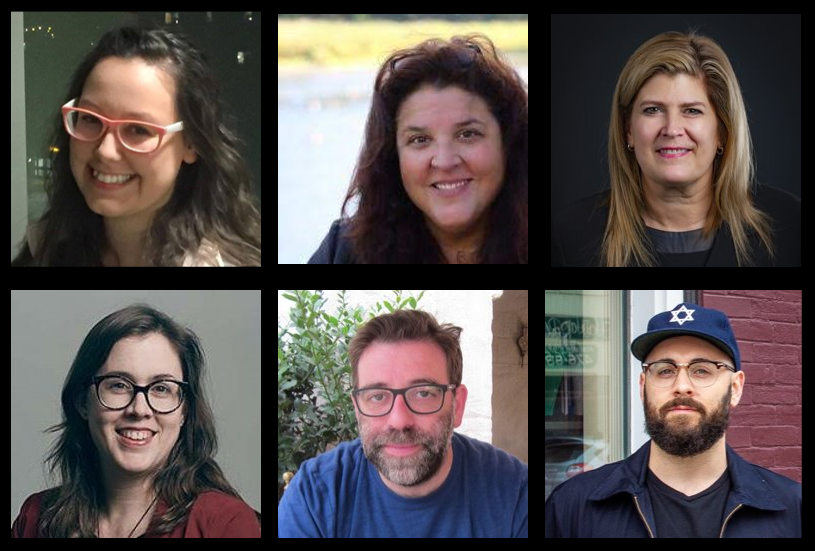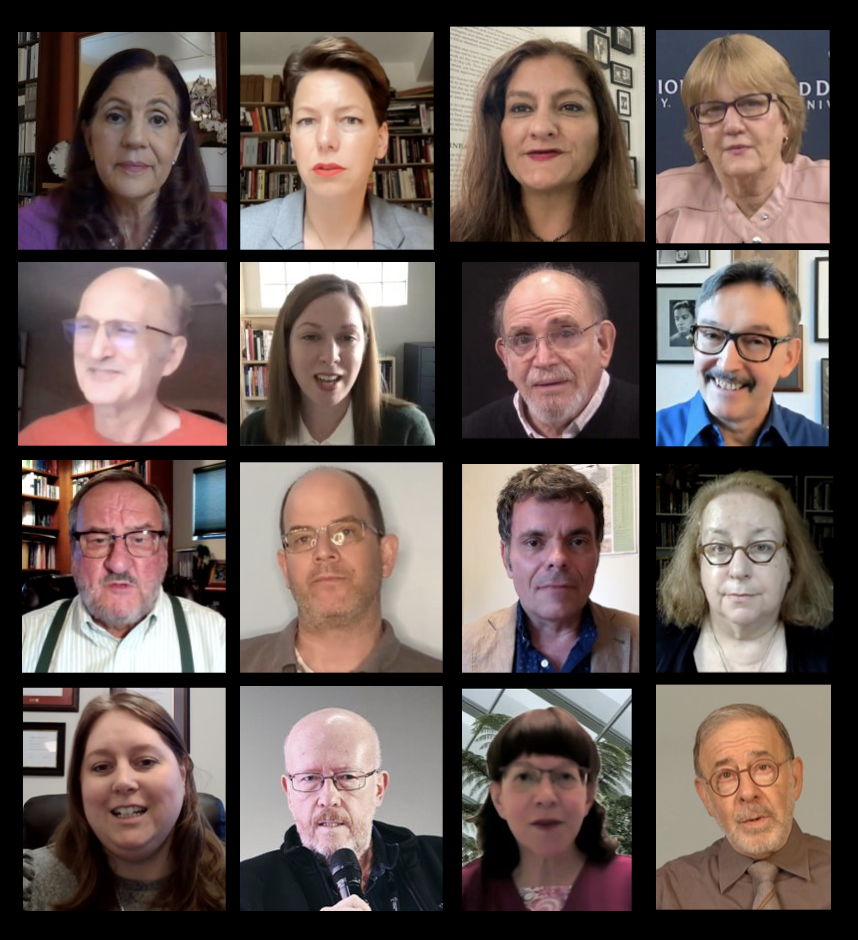Introduction
Welcome to the Hear Our Voices: Survivors Share Stories of Trauma and Hate project. This bilingual project begins with a scholarly and ethical commitment to centre the experience of survivors and Jewish victims in studying and teaching about the Shoah, the Holocaust.
Please view our trailer to learn more about the Hear Our Voices project.
Project Overview
- Elements: Five online modules that may be used together or individually.
- Format: Presented as an online “pressbook” which organizes and presents text, audio, video, and interactive content.
- Audience: The project is designed for second year university courses and selected content will be appropriate for upper-level undergraduate and graduate courses as well as secondary schools.
- Languages: English and French: all text, audio and video.
- Disciplines: Holocaust & Genocide Studies, History, Religious Studies, Gender & Sexuality Studies, Humanities, Sociology, Feminist Methods, Oral History.
The Oral Histories

The project includes new oral history interviews with survivors, members of the second generation, and families of Righteous Gentiles. Learn more about our participants and their stories.
Our most recent interviews mark a key juncture in Holocaust Oral History where we are hearing from the youngest survivors and the second generation as they step in to tell their family’s stories.
We have also curated oral histories from archives across Canada and around the world. These span the long history of survivor testimony, allowing for a broader range of experiences and perspectives of survivors who were of varying ages during the war.
Organized through the thematic question of each module, these oral histories enrich our understanding of the complexity and variability of Holocaust experiences. Cumulatively, these oral histories invite us to reflect not only on the horrors of the Holocaust, but also on the humanity of those who survived and perished.

The Modules
Hear Our Voices is organized into five online modules to provides educators, students and the public at large with curated resources for learning about the Holocaust. All materials are available in English and French in accessible formats.
- Oral History
- Gender and Sexuality
- Religion and Culture
- Antisemitism and Racism
- Memory and the Holocaust
The first module, “Oral History,” focuses on survivor testimony ranging from the Nuremberg Trials to the present, and on the role of oral history in making space for as many voices as possible in the historical record. The second module, “Gender and Sexuality,” focuses on how gender and sexuality function within the history of the Holocaust in terms of national socialist ideologies and policies and how these worked together in shaping the behaviour and experiences of perpetrators, bystanders, and victims. The third module, “Religion and Culture,” examines Jewish, Christian, and Muslim responses to the Holocaust, how Nazi ideology and policy engaged each religion and religious community, how religious leadership responded to national socialism and the fact of the Final Solution, and the role of Righteous Gentiles. The fourth module, “Antisemitism and Racism,” explores how anti-Jewish and antisemitic attitudes, behaviours, and policies develop over time and assesses how these contributed to the genocide against Europe’s Jewish populations. Inspired by the ways in which our new oral histories explore the theme of memory among survivors, the second generation, and the family of Righteous Gentiles, the last module, “Memory and the Holocaust,” reflects on how the Holocaust is remembered, and how that memory has been shaped over time in Canada and globally.
These modules work together to offer a contextualized learning experience of the Holocaust while highlighting what is at the core of this project, the survivors’ stories.
Key Questions and Approaches
- Focusing on Survivor Voices: What happens when we foreground survivor voices? What do we need to understand their experiences? What are the ethical and scholarly issues when we use oral history? Which survivor voices have been excluded and marginalized and are now emerging? How can we better understand intersecting identities in this history?
- Context matters: How do we study the Holocaust with attention to historical, religious, cultural, and political contexts?
- Spotlight on historiography: How has Holocaust scholarship changed over time? How have the questions and definitions shifted? Which aspects have been historically underrepresented and which are only now emerging?
- A question of memory: How do we remember the Holocaust as individuals, communities, and as nations? What is the relationship between history, memory, representation, and historiography?
- Contemporary questions: How does this history relate to our world today and how we continue to grapple with issues of antisemitism, racism, sexism, homophobia, Islamophobia, and other prejudices and oppressions? How can we engage this history through an EDI (Equity, Diversity and Inclusion [Equality]) framework and how can we engage EDI issues in light of this history?
Oral Histories in Context
Each module places oral histories in context through mini-lectures and by bringing the oral histories into conversation with other oral histories by using primary archival sources such as documents, photographs, artefacts, and historical film footage.

Students will interact with the material through content such as timelines, maps, and “hot-spot” images that allow students to click through to learn more about an artefact or topic. Sample assignments and questions are included throughout the project.
Scholarly Voices
Each module includes framing mini-lectures from the Hear Our Voices Team, scholars working in the areas of cultural studies, history, literature, oral history, and religious studies

Left to Right (top): Marie-Catherine Allard (doctoral candidate in Cultural Mediations, Carleton University), Dr. Deidre Butler (Director, Max and Tessie Zelikovitz Centre for Jewish Studies and Associate Professor, Religion program), Dr.Hilary Earl (Professor of Modern European History and Genocide Studies at Nipissing University in North Bay).
Left to Right (bottom) Dr. Anna Sheftel (Principal, Associate Professor, and Acting Graduate Program Director, School of Community and Public Affairs at Concordia University), Dr. Hernan Tesler-Mabé (Adjunct Professor in the Department History and of Classics and Religious Studies, Coordinator of the Vered Jewish Canadian Studies Program and President of the Association for Canadian Jewish Studies), Jesse Toufexis (doctoral candidate in the Department of Classics and Religious Studies at the University of Ottawa).
Senior and Emerging Scholars
Each module also includes guest lectures by senior and emerging scholars from across Canada and internationally who share their expertise on particular historical questions.

Left to Right (first row): Dr. Jennifer Craig-Norton (Visiting Fellow of the Parkes Institute for the Study of Jewish/Non-Jewish Relations, University of Southampton UK), Dr. Anna Hájková (Associate Professor of Modern Continental European History at the University of Warwick), Dr. Mehnaz Afridi (Director, Holocaust, Genocide & Interfaith Education Center, Manhattan College), Dr. Annette Finley-Croswhite (Professor of History, Old Dominion University).
Left to Right (second row): Dr. Franklin Bialystok (Lecturer, History, University of Toronto), Dr. Rebecca Carter-Chand (Director, Programs on Ethics, Religion, and the Holocaust, United States Holocaust Memorial Museum), Dr. Henry (Hank) Greenspan (Psychologist, Oral Historian, and Playwright in the Residential College of the University of Michigan, emeritus), Dr. Klaus Mueller (Historian, Filmmaker, Curator, Representative for Europe, United States Holocaust Memorial Museum).
Left to Right (third row): Dr. Geoffrey Giles (Associate Professor in the Department of History at the University of Florida), Dr. Shawn Graham (Professor of Digital Humanities, Carleton University), Dr. Richard Steigmann-Gall (Professor of History at Kent State University), Dr. Paula J. Draper (Historian of Canada and the Holocaust).
Left to Right (fourth row): Jessica Marino (doctoral candidate in Cultural Mediations, Carleton University), Dr. Jan Grabowski (Professor of History at the University of Ottawa), Dr. Judy Baumel-Shwartz (Professor of Jewish History at Bar-Ilan University), Dr. David Roskies (Sol & Evelyn Henkind Professor of Yiddish Literature and Culture at the Jewish Theological Seminary).

